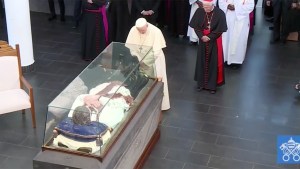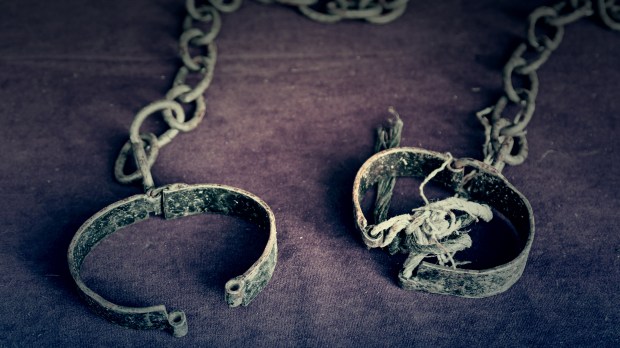Almost 60 years before Columbus discovered America – and before the trans-Atlantic slave trade that would shape the destiny of African-Americans – the Catholic Church condemned slavery and held out excommunication for those who would enslave others.
“We already had the papal condemnation of slavery as soon as this crime was discovered,” wrote Fr. Joel S. Panzer, author of The Popes and Slavery.
“There existed, of course, the practice of various types of slavery before the 15th century,” Fr. Panzer wrote in a 1996 article in “The Catholic Answer.” “However, it was not until the 15th century, and with growing frequency from the 16th to the 19th centuries, that racial slavery as we know it became a major problem.”
Responding to news from the Canary Islands about locals being forced into servitude, Pope Eugene IV wrote to Bishop Ferdinand on the island of Lanzarote. The letter took the form of a papal document known as a “papal bull” and was called Sicut Dudum. In it, Pope Eugene condemned the enslavement of the black natives of the newly colonized islands.
“They have deprived the natives of their property or turned it to their own use, and have subjected some of the inhabitants of said islands to perpetual slavery, sold them to other persons and committed other various illicit and evil deeds against them,” Pope Eugene wrote. He ordered anyone involved to abandon such a practice and “restore to their pristine liberty all and each person of either sex who were once residents of said Canary Islands … who have been made subject to slavery. These people are to be totally and perpetually free and are to be let go without the exaction or reception of any money.”
Christians who did not restore the enslaved to liberty would be excommunicated, the pope made clear.
“With Sicut Dudum, Eugene was clearly intending to condemn the enslavement of the people of the Canaries and, in no uncertain terms, to inform the faithful that what was being condemned was what we would classify as gravely wrong,” Fr. Panzer wrote. “Thus, the unjust slavery that had begun in the newly found territories was condemned, condemned as soon as it was discovered, and condemned in the strongest of terms.”
Of course, slavery persisted, but it would not be the last word from the Church. In 1537, Pope Paul III issued a pontifical decree called Sublimis Deus – “The Sublime God.” Unlike Sicut Dudum, however, it was addressed to all of the faithful in the world, not to one particular bishop.
“Sublimis Deus was intended to be issued as the central pedagogical work against slavery, Panzer noted. “Two other bulls would be published to implement the teaching of Sublimis, one to impose penalties on those who fail to abide by the teaching against slavery, and a second to specify the sacramental consequences of the teaching that the Indians are true men.”
“Enemy of the Human Race”
Ultimately, slavery comes from Satan, Pope Paul said. “The enemy of the human race, who always opposes all good men so that the race may perish, has thought up a way, unheard of before now, by which he might impede the saving word of God from being preached to the nations,” he explained. “He has stirred up some of his allies who, desiring to satisfy their own avarice, are presuming to assert far and wide that the Indians of the West and the South who have come to our notice in these times be reduced to our service like brute animals, under the pretext that they are lacking the Catholic Faith. And they reduce them to slavery, treating them with afflictions they would scarcely use with brute animals.”
Statements against slavery would continue to come from the Vatican, notably, from Popes Gregory XIV in 1591, Urban VIII in 1639, and Benedict XIV in 1741. Pope Pius VII made efforts at the Congress of Vienna in 1815 to have the victors over Napoleon outlaw slavery.
Unfortunately, as Pope Gregory XVI noted in the Constitution In Supremo, the slave trade was still being carried on “by numerous Christians” in 1839. “Therefore, desiring to remove such a great shame from all Christian peoples … We, by apostolic authority, warn and strongly exhort in the Lord faithful Christians of every condition that no one in the future dare to bother unjustly, despoil of their possessions, or reduce to slavery Indians, Blacks or other such peoples,” Gregory XVI wrote in that year, a quarter century before Abraham Lincoln’s Emancipation Proclamation. “Nor are they to lend aid and favor to those who give themselves up to these practices, or exercise that inhuman traffic by which the Blacks, as if they were not humans but rather mere animals, having been brought into slavery in no matter what way, are, without any distinction and contrary to the rights of justice and humanity, bought, sold and sometimes given over to the hardest labor.”
A misunderstanding
Some American bishops misinterpreted Gregory as condemning the slave trade rather than slavery itself, Panzer noted, but since In Supremo cited the antislavery teachings of previous popes, “it is hard to understand how the American hierarchy was not aware of the consistency of the teaching and its nature.”
Gregory’s view also stretched back to “the efforts of the Apostles and other early Christians to alleviate out of the motive of Christian charity the suffering of those held in servitude,” and the fact that “they encouraged the practice of emancipating deserving slaves,” Panzer said.
“This teaching was founded in the teachings of Our Lord that all people are loved immensely by God the Father, and have received the vocation to redemption and eternal happiness in Christ the Son,” wrote the historian-priest. “At the same time, it must be remembered that Christians themselves, and notably members of the clergy, frequently and sometimes blatantly violated this same teaching. Nevertheless, the Catholic tradition of opposition to unjust servitude was a great help in eventually bringing about an end to the enslavement of the Indians and blacks in many parts of Latin America, as well as of the peoples in the Philippines and other areas.”



